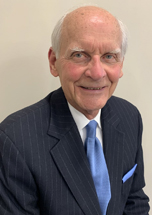Personal Reflections on a Business School Education

March 20, 2020 | By W. Randy Boxx
Let me start off by providing a brief statement about the person reflecting on a business school education. In February 1967, I entered the College of Business Administration at the University of Arkansas to earn my Ph.D. in business administration.
Having done so, I taught full-time at the university in 1970 and then, in 1971, I began a 42-year academic career in business schools at three different institutions — University of Mississippi, Millsaps College and Shenandoah University.
While holding faculty rank and deanship positions at each of those institutions and having “retired” 7.5 years ago from my last institution, I chose to continue to work with business schools in a consulting capacity in two primary areas — AACSB accreditation and strategic visioning.
The consulting work, as of today, has resulted in consultations with 90 different business schools in the United States, Canada, Latin America, Asia, Europe and the Middle East, many of whom have had me back for multiple visits and assignments.
From this background, I offer my reflections on what business school education should be about today based on my 50 years of working in and for business schools.
Global, Fast Moving, Technological Environment
As a graduate of the predecessor College of Business Administration to the current Sam M. Walton College of Business, I join faculty, administrators and professional staff as we prepare graduates to live fulfilling lives and to be prepared for successful careers in today’s globally competitive, fast moving and technological business environment. We all want our graduates to be highly desired by successful businesses and other organizations.
In addition to professional success, we want our graduates to have had an educational experience that will enable them to make a difference where they live and to make a positive contribution to the broader society.
Our world, and especially the business world, is changing dramatically. Business institutions have had to radically restructure themselves to survive in a world economy that requires a global knowledge orientation for much of their workforce. Science and technology have become major players in the economies of developed and developing countries and is changing many aspects of our lives. Complexity, speed and mobility characterize today’s workplace.
As the workplace changes, so will organizations and the attributes that are sought in employees. Today’s attributes and competencies derive from an education that encourages observation, exploration, analysis, decision making and communication.
The competitive advantage for a firm depends more than anything on its knowledge base. It depends on what the firm knows, how it uses what it knows and how fast it can learn something new.
As work itself changes, there is much greater emphasis on knowledge and especially knowing what to do with knowledge as it is gained. Knowledge and continuous learning represent the preeminent sources of sustainable advantage in a fast-moving, highly competitive, global world.
Good Enough Is No Guarantee of Survival
Being good enough today is absolutely no guarantee of surviving tomorrow. With the rapid changes in new technology, the existence of global economies and the dominance of niche marketing, businesses need people who are innovative and can deal with change in an effective manner.
Businesses need people who can work across disciplines and cultural boundaries. Businesses need people who can work collaboratively and think analytically, creatively and practically.
Education is critical to an organization’s competitive success as well as to an individual’s career success. Organizational leaders want graduates who can solve problems and communicate effectively, be skilled in working in teams sometimes as a team leader and other times as a team member, be proficient in information analysis and technology, knowledgeable about the global environment in which they must function, adept in working with culturally diverse associates, and possess specialized business knowledge.
They want individuals who can solve problems and work with perspectives across different business disciplines, cultures and non-business areas.
I am convinced that against the backdrop of a diverse world economy, a person’s competence in business is dependent not only on having the best business education possible with core and specialized business courses but also on a mastery of the liberal arts. A strong background in the liberal arts enables us to be more aware of and involved with people, life and the world.
In the final analysis, this is precisely what business is all about. Businesses obtain results through people, and they compete against people.
Quick to Envision New Possibilities
The liberal arts provide the background and skills necessary for business professionals to be accurate in their observations and quick to envision new possibilities. A broad base of learning coupled with critical thinking and analytical skills allows an individual to exercise good judgment and to separate the trivial from the important. This type of education also emphasizes the importance of doing what is right and honorable — a critical practice for functioning in the modern business arena.
But judgment and understanding alone will not ensure success. Truly effective people must possess the ability to communicate in a concise manner with accuracy and vigor.
When communication skills in an organization diminish, then the quality of thought will deteriorate as well. Students should never forget that the best way to become good communicators is to study good communicators and practice. Critical thinking skills and communication skills are truly interdependent.
Understanding All of Our World
Students must understand that success in the business world requires the ability to work with and compete against not only the traditional, English speaking world, but with the entire world with all its diversity of culture, language, history, race, gender, age, religion and political philosophies. There is no way to succeed in many businesses without understanding all of our world and its many people.
Know the people with whom you are doing business. Know their values, their mores and what drives them. A provincial approach to business is just not on the program of the future.
Business students who learn other languages have a tremendous advantage in the marketplace. Students who read literature from around the world should clearly understand that business after all is a social enterprise.
One should never forget that at the end of the day, you win by understanding people. A business school education must provide this important base of knowledge and understanding in addition to the functional fields of business.
I believe that today’s students are motivated. They have tremendous access to information and a strong desire to become the best entrepreneurs or corporate managers that they can become.
I hope, however, that today’s students will always strive for balance and perspective. At the end of their educational degree program, they will go to work and have the ability to make money, but they also will have the ability to do more than that. They will have the opportunity to bring about the kind of change that is essential if we are to continue to enjoy the fruits of a free, safe and ethically responsible society.
Test Your Limits
While you are a college student as well as when you join the workforce, test your limits in accomplishing worthwhile goals, in taking risks and in doing the things you believe will make a better future for people of all walks of life. Always treat your classmates, faculty, professional staff as well as your future colleagues, employees and customers with dignity and respect.
Develop your communication, leadership and teamwork skills in the Walton College, and remember to care more about your team than you do about yourself. Take on internships, participate in study abroad programs, join and lead business clubs, seek the advice from two mentors (one academic and one business practitioner), volunteer for different assignments, seek out consulting and other real-world projects, participate in research or community service projects with faculty members, be involved in different types of competitions, learn a foreign language and acquire professional credentials, certificates or badges.
Consider how the individual portfolio you are building is different from your peers’ and how it will set you apart in seeking and securing a job. Lead by example, and never expect your team, be it a student or work team, to do more than you are willing to do yourself.
Never give the appearance of elevating your career at the expense of someone else. We’re all competitive, but we need to earn the respect of our peers. And remember, when you earn your degree do not wear it on your sleeve. Let your qualifications and performance speak for you.
Develop a reputation for absolute dependability as a student. Follow up on 100% of your responsibilities. When I have asked individuals who worked with and for me to do five things and they carry out only three of them, I get very insecure about what they are not going to do. It is very important that you follow up completely on all of your responsibilities.
Pour Yourself into Your College Experience
Beginning today, pour yourself completely into your college experience, and later, give something of significance back to your community and to society. You are the future of our society, and you can make a difference.
Don’t be just a taker; be a giver. Anchor yourself in your own convictions, know who you are, and what you value. Doing the moral thing — to right a wrong — these actions will become defining moments in your lives. While in the Walton College and later wherever you might be, pursue excellence in all that you do, and think outside the box.
Your life should be about getter better, constantly raising the bar and enjoying what you are doing to the fullest. As I discussed with my faculties at three different institutions of higher learning, we are to be totally committed to providing our students with a high-quality education, but we are also to do more than that.
Paraphrasing the late President James Monroe, at the end of our students’ educational experience, what we should be concerned about is not so much what the student has learned, but what the student has become and will learn in the future. We desire our students to become all they are capable of becoming. We desire them to see more, see differently, and see holistically. Each of us must be actively involved in shaping the educated mind.

